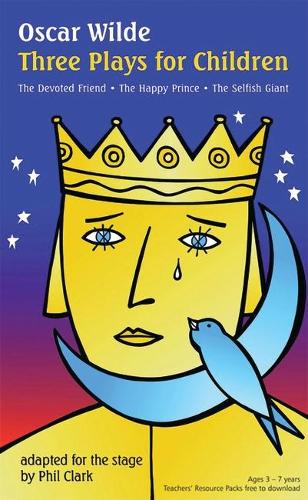
Oscar Wilde: Three Plays for Children
(Paperback)
Publishing Details
Oscar Wilde: Three Plays for Children
By (Author) Phil Clarke
By (author) Oscar Wilde
Bloomsbury Publishing PLC
Oberon Books Ltd
2nd November 2007
United Kingdom
Classifications
General
Non Fiction
Childrens / Teenage general interest: Playscripts
822.92
Physical Properties
Paperback
128
Width 130mm, Height 210mm
170g
Description
Three of Wildes short stories adapted into enchanting plays for young children. The Selfish Giant chases away spring and summer, leaving the garden in a permanent winter. Only when the giant realises his selfishness and opens his garden to the local children does the summer return bringing with it warmth, brightness and joy. The people of the town celebrate the unveiling of their new statue of The Happy Prince. But all is not as it seems with this new golden statue. In his desire to help the poor and suffering in the town, the Prince persuades a migrating swallow to assist him, and a timeless tale of love and kindness is born. What makes a good friend Little Hans's best friend is Hugh the Miller but while Hans is happy to share all the lovely flowers and fruit from his garden, Hugh isn't quite so generous with his own things. Join three lively characters in The Devoted Friend as they explore the ups and downs of friendship in this new play for the very young. The Devoted Friend opened at the Sherman Theatre, Cardiff throughout November and December 2007. The Selfish Giant and The Happy Prince were staged to great acclaim during Christmas 2005 and 2006 respectively.
Author Bio
Oscar Fingal O'Flahertie Wills Wilde (b. Dublin, 1854) was an Irish playwright, who wrote one of the best loved comedies in the English language - The Importance of Being Earnest (1895). A leading wit and conversationalist in London society, his career was destroyed at its height when he was imprisoned for homosexual offences. Wilde was born in Dublin and educated at Trinity College, Dublin, and Magdalen College, Oxford. Settling in London, he became famous for his extravagant dress, long hair, and paradoxical views on art, literature, and morality. His first play, Vera (1880), a tragedy about Russian nihilists, was produced in New York to poor reviews. Success in the theatre came with the elegant drawing-room comedy Lady Windermere's Fan. A Woman of No Importance (1893) was another success. Other works for the theatre were An Ideal Husband (1895) and the biblical Salom (1896), written in French for Sarah Bernhardt. Wilde flaunted his homosexual affairs, including his ill-fated liaison with Lord Alfred Douglas. Following a celebrated trial in 1895 he was sentenced to two years' imprisonment with hard labour. The sentence led to public humiliation, poor health, and bankruptcy. On his release in 1897 he left for France and remained in exile there until his death in 1900.
